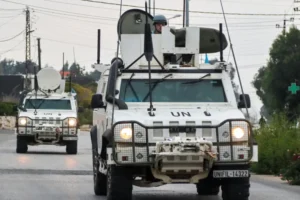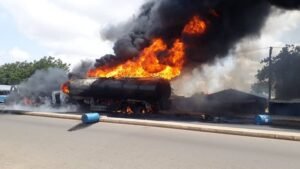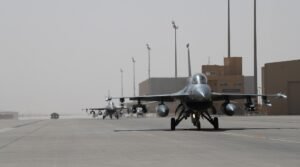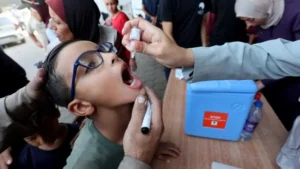Intensified ground clashes erupt in Gaza following Israeli escalation

Fierce battles have erupted in the Gaza Strip as Israel’s military announced an expansion of its ground operations, intensifying its bombardment of the Palestinian territory. This escalation comes three weeks after a devastating attack that stands as one of the deadliest in Israel’s history.
In response to the escalating violence and dire humanitarian conditions, the United Nations has issued a dire warning, describing a looming “unprecedented avalanche of human suffering” within Gaza. The UN General Assembly has echoed these concerns and has called for an “immediate humanitarian truce.”
Hamas, the Palestinian group governing Gaza, confirmed that Israeli ground forces have entered Beit Hanoun in the northern part of the Gaza Strip, as well as the eastern area of Bureij in the center, leading to intense confrontations. Israeli military spokesman Major Nir Dinar stated, “Our troops are operating inside Gaza as they did yesterday.”
The latest escalation follows a series of events that began with a Hamas incursion into Israeli territory on October 7, resulting in significant casualties and the taking of hostages, according to Israeli officials. The health ministry in Gaza, controlled by Hamas, has reported a devastating toll of 7,326 casualties, including more than 3,000 children, as a result of Israeli airstrikes.
In anticipation of a full-scale invasion, tens of thousands of Israeli troops have amassed along the Gaza border. Limited ground incursions were reported earlier in the week, and Israeli military spokesman Daniel Hagari announced late on Friday that “the ground forces are extending the ground operations tonight.”
The Israeli army has reported a substantial increase in its strikes, while the Ezzedine al-Qassam Brigades, the military wing of Hamas, declared on Telegram that they had responded with a barrage of rockets.
Overnight airstrikes targeted “terror tunnels, underground combat spaces, and additional underground infrastructure,” with the Israeli army confirming the elimination of several Hamas militants on Saturday morning.
Throughout the night, dramatic images captured by AFP showed the night sky in northern Gaza illuminated by continuous airstrikes, while thick black smoke obscured the horizon.
On the ground, residents of Gaza face harrowing circumstances. Om Walid Basal, a 50-year-old resident in the Tal al-Hawa neighborhood, lamented the destruction of her apartment block, saying, “This was our house. We lived here just with our children. It was full of children. Why are they bombing us? Why are they destroying our homes?”
Hamas has maintained its readiness for an invasion, with Ezzat al-Rishaq, a senior member of the Hamas political bureau, stating, “If (Prime Minister Benjamin) Netanyahu decides to enter Gaza tonight, the resistance is ready. The remains of his soldiers will be swallowed up by the land of Gaza.”
However, amid these hostilities, Hamas has reported a complete blackout of internet and communication services throughout Gaza, accusing Israel of taking this measure to enable retaliatory airstrikes.
Human Rights Watch has raised concerns about this near-total telecommunications blackout, warning that it could provide cover for “mass atrocities.” The Palestinian Red Crescent has also reported disruptions in ambulance services due to the communications outage.
The UN’s humanitarian coordinator for the Palestinian territories, Lynne Hastings, emphasized the importance of communications for hospitals and humanitarian operations, calling for their restoration.
In response to the intensifying conflict, the UN General Assembly passed a non-binding resolution on Friday calling for an “immediate humanitarian truce” in Gaza, with 120 member states voting in favor, 14 against, and 45 abstentions. Palestinian ambassador to the UN, Riyad Mansour, lauded the resolution, urging an end to the war.
The resolution received mixed reactions, with Israel and the United States criticizing it for not explicitly mentioning Hamas. Israel’s ambassador to the UN, Gilad Erdan, described it as an “infamy.” The U.S. had previously expressed support for a “humanitarian pause” to allow aid to reach Gaza.
The ongoing Israeli bombardment has displaced over 1.4 million people in the densely populated territory, resulting in a severe shortage of essential supplies, including food, water, and electricity. Israel’s blockade on fuel deliveries, citing concerns about weapon production by Hamas, has further exacerbated the crisis.
UN Secretary-General Antonio Guterres stressed the urgency of the situation, stating, “Without a fundamental change, the people of Gaza will face an unprecedented avalanche of human suffering.”
The UN Relief and Works Agency for Palestinian Refugees (UNRWA) has warned that catastrophic shortages in Gaza will lead to more deaths. Philippe Lazzarini, UNRWA’s chief, highlighted the dire consequences of the siege and the limited aid delivery.
The situation in Gaza is dire, with the UN reporting the closure of 12 out of 35 hospitals due to the ongoing bombardment and fuel shortages. Israel has accused Hamas of using hospitals for military operations, an allegation that Hamas vehemently denies.
The mounting toll in Gaza has prompted demonstrations in the occupied West Bank and across the Muslim world, as well as in several Western countries. Additionally, the West Bank has witnessed a sharp increase in violence since the October 7 attacks, with more than 100 Palestinians killed and nearly 2,000 wounded, according to the UN.








